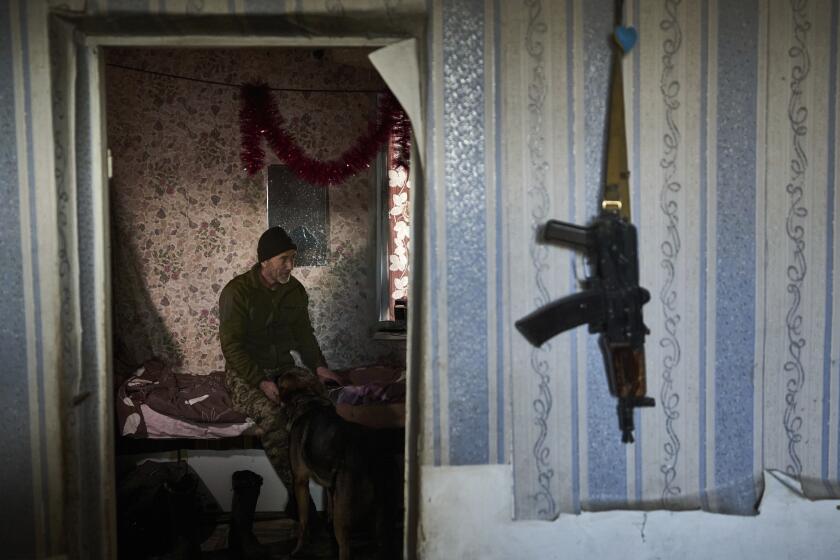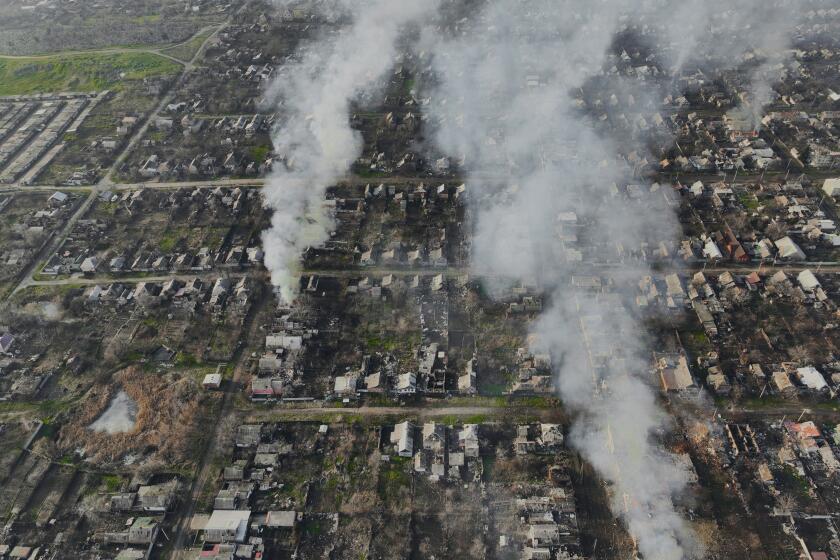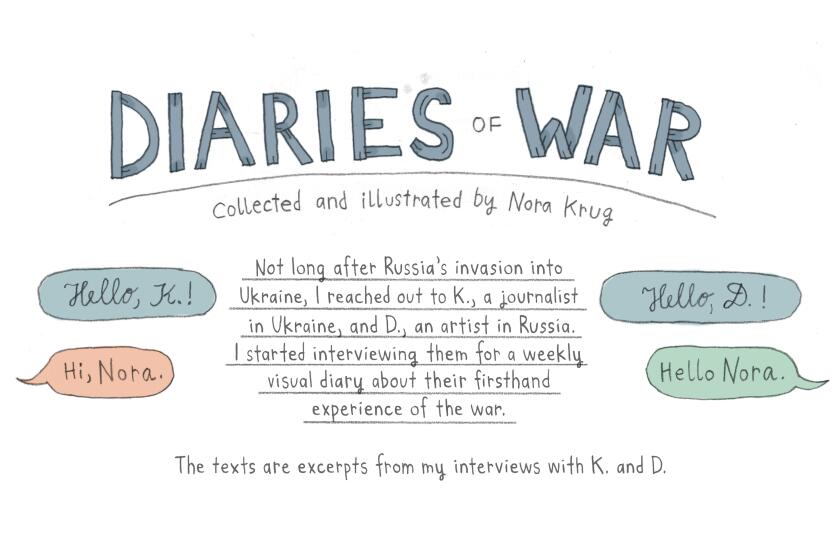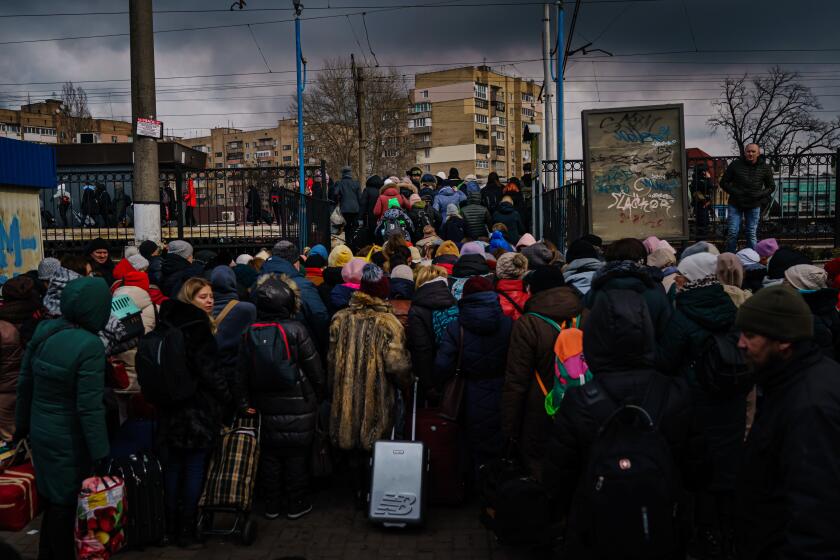Column: Is it time to wind down the war in Ukraine and start peace talks?
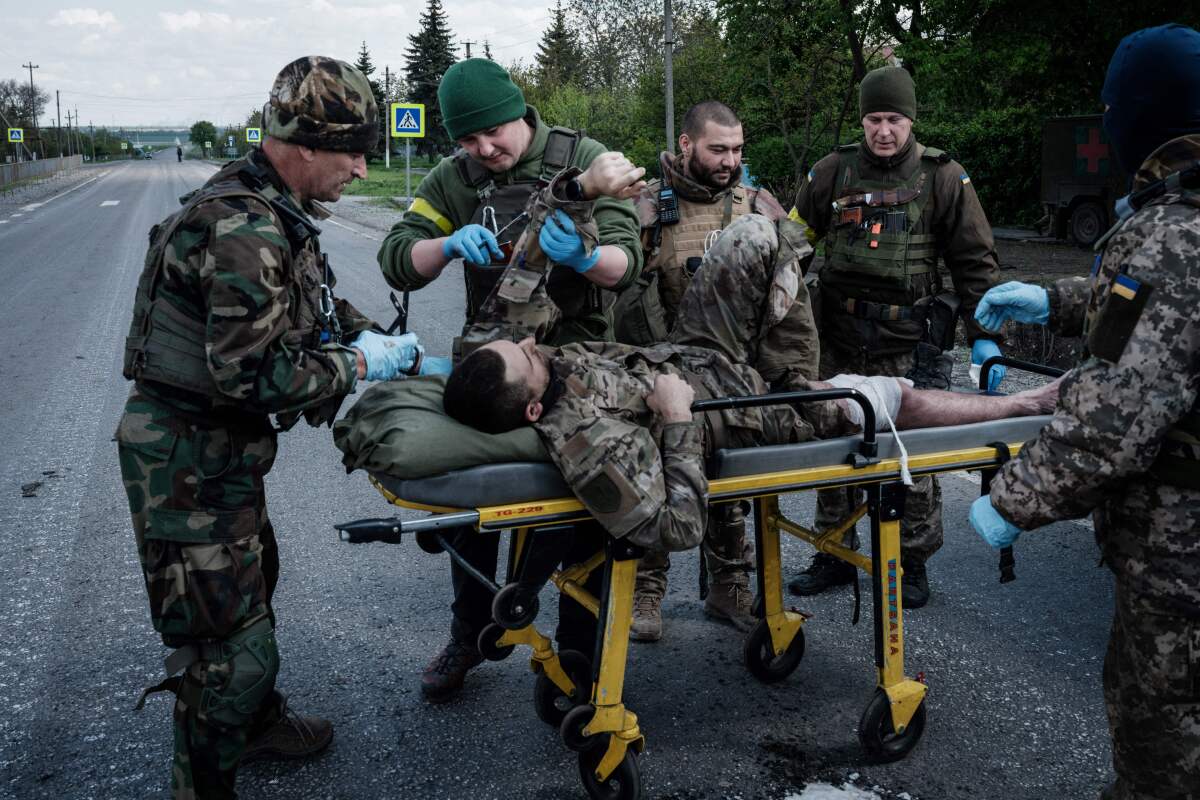
- Share via
There’s been a lot of uplifting, we’re-in-it-to-win-it language used about the Ukraine war recently. The message being sent is that the United States is committed for the long haul and won’t abandon its friends to a brutal aggressor like Russian President Vladimir Putin.
It’s a moving display of solidarity, including last week’s visit by Ukrainian President Volodymyr Zelensky to the White House — especially since it comes against the backdrop of 100,000 Ukrainian soldiers and 40,000 civilians killed or wounded, according to the Pentagon, since Russia invaded Ukraine in February.
“We will stay with you for as long as it takes,” President Biden told Zelensky.
But does he mean it? And even if he does, can the U.S. be trusted to follow through?
Opinion Columnist
Nicholas Goldberg
Nicholas Goldberg served 11 years as editor of the editorial page and is a former editor of the Op-Ed page and Sunday Opinion section.
For that matter, should we encourage the war indefinitely, helping Ukraine drag out its fight in hopes of a decisive military victory?
The war in Ukraine poses complicated questions. Of course we want to support our allies, who are fighting fiercely to protect their country and their territorial integrity against foreign invaders. But it’s by no means clear how long “as long as it takes” will take, or whether the American government and its NATO allies will really stick it out.
Ukraine has persevered — defying odds and expectations — for nearly a year, buoying some people’s hopes that it can actually prevail on the battlefield. It has pushed the Russians, who no doubt foresaw an easy victory, back from Kyiv, out of the Kharkiv region and the city of Kherson.
But what’s next? Some analysts believe Ukraine can and will drive Russia out of Ukraine entirely. Others worry that the cost in dollars and lives is becoming unacceptably high, that the threat of dangerous military escalation is growing or that the Russians might turn the tide in the war.
Ukrainian President Volodymyr Zelensky sounds another defiant note on his return to his homeland after his wartime visit to the United States.
The latter group believes it’s time to think seriously about negotiating for peace.
I’m torn, like many people. I entirely agree that Putin is dangerous and irresponsible, and I’d like to see his army pushed out. Occupying another country’s territory by force is unacceptable. And I’m not deaf to the argument that if the world permits such behavior today, it encourages Putin to go farther and others to emulate him.
The ideal message to send is that we are united in our irrevocable commitment to oppose Russian atrocities and imperial conquest.
But I know us.
It’s all very well for Biden to say we’re with you “for as long as it takes,” but Biden is in no position to make such a promise; he faces reelection in 2024. Furthermore, history suggests Americans are not inclined to stay involved indefinitely in faraway crises if the costs grow too high.
Russia’s foreign minister warns that Ukraine must meet Moscow’s demand for ‘demilitarization’ and the removal of the military threat to Russia.
Republicans, who will take control of the House of Representatives next week, are already grumbling that Ukraine shouldn’t get a “blank check.” (With the signing of the budget bill this week, U.S. aid to Ukraine since February will reach more than $100 billion.)
NATO allies in Europe may wobble as well, as the costs of war mount, gas prices rise in the winter and millions of refugees stream in.
For Ukraine and its North Atlantic Treaty Organization supporters, deciding when to go to the negotiating table to try to bring the military phase of the conflict to an end is a question of pragmatism, strategy and timing.
Lots of factors need to be considered. Which side is in the stronger battlefield position? Which benefits from a continuation of the fighting? Is a decisive Ukrainian victory possible or could there be a reversal of fortunes? Could the war spread geographically or escalate from conventional to nuclear weapons? How committed is NATO? For how long will Ukrainians be willing to fight on, as casualties mount? Will Russia negotiate seriously and can it be trusted to keep its word?
K. thinks about how the war has affected old friendships. D. considers all that will need to be done by Russia to atone for its attack on Ukraine.
And are there settlement terms that would meet the minimum requirements of both sides?
Charles A. Kupchan, a senior fellow at the Council on Foreign Relations and professor of international affairs at Georgetown University, says that even as we aid Ukraine, it’s time to think seriously about what a negotiated endgame might look like.
“So far the administration has had it about right: Give the Ukrainians the arms they need to defend themselves, hit the Russians hard with sanctions and bulk up NATO’s eastern flank,” he says. “But I do think the prospect of a war that continues for the indefinite future runs the risk of escalation because you just don’t know what the Russians will do.”
(On Monday, Ukraine launched its third strike this month deep into Russian territory, apparently unworried about the possibility of escalation.)
Kupchan says a Russian withdrawal from every inch of Ukrainian territory — including Crimea, which it occupied for eight years before the February invasion — is not a realistic or necessary starting point for negotiations. And he thinks Ukraine should consider dropping its bid for NATO membership.
Narratives of war are often framed around the heroic acts of men. But women bear the brunt of war’s brutality, in conflicts from Sri Lanka to now Ukraine.
There have apparently been no meaningful negotiations in months and Ukrainian officials said this week that there won’t be until Moscow withdraws its troops and faces a war crimes tribunal. Russian officials, including Putin over the weekend, insist they’re open to talks. But Russia has set unreasonable conditions — among them, acceptance of its illegal annexation of four Ukrainian territories in late September — and U.S. officials doubt they would negotiate in good faith.
The world is left with a terrible status quo. Ukraine fights fiercely as if the war — and allied help — will go on indefinitely. Russia continues to destroy Ukrainian towns and cities, and perhaps plans a new surge, with few signs of a dent in Putin’s power.
We are left looking — so far in vain — for offramps, de-escalators and mutually acceptable compromises that end the carnage and ensure a free, independent Ukraine. It’s not time to cut our support for Ukraine, but it is time for both sides to begin laying the groundwork for talks.
More to Read
A cure for the common opinion
Get thought-provoking perspectives with our weekly newsletter.
You may occasionally receive promotional content from the Los Angeles Times.

